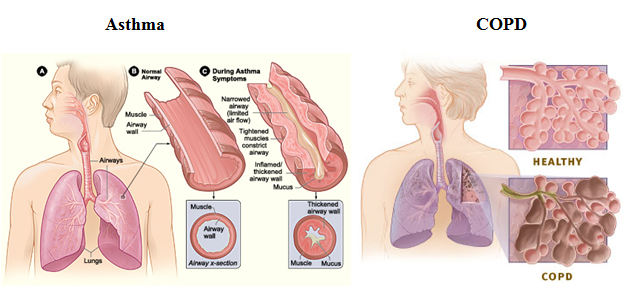Save 25% On Your First Autoship Order
Save 25% On Your First Autoship Order

People with Chronic Obstructive Pulmonary Disease (COPD) and Asthma are familiar with the common symptoms like coughing, wheezing and shortness of breath. It’s easy to mistake one condition for the other as they have one big thing in common: The inability to get enough air into the lungs. Alternatively, after diagnosing the symptoms, medical history, and results of medical tests, the doctor can further determine the severity of it. But both the conditions are different from each other.

Environmental factors that increase the risk of COPD include occupational dusts, long term exposures to cigarette fumes, chemicals and indoor or outdoor pollution. A childhood history of respiratory infection can lead to reduced lung function in adulthood.
Disclaimer: All content found on our website, including images, videos, infographics and text were created solely for informational purposes. Our content should never be used for the purpose of diagnosis or treatment of any medical conditions. Content shared on our websites is not meant to be used as a substitute for advice from a certified medical professional. Reliance on the information provided on our website as a basis for patient treatment is solely at your own risk. We urge all our customers to always consult a physician or a certified medical professional before trying or using a new medical product.

Ayush Henry, has been a Health Products For You contributor since 2016. He holds an MBA in hospitality and a MA in English. A professional HR soft skills trainer and copywriter, he ...
How To Increase Iron Levels Quickly
It’s a question that must have puzzled you like many others. Iron is essential in hemoglobin production and its inadequate levels can negatively impact your health. Dive into this informative article to explore top iron-rich foods that can help you fight iron deficiency.
10 Best Coccyx Cushions for Tailbone Pain
If you're like most people, you spend about 8 to 10 hours sitting every day. However unhealthy, it is part of life for many, and can cause tailbone pain. Coccyx cushions can help alleviate this pain. Click to read more and find the perfect coccyx cushion for your tailbone pain.
5+ Best Adult Diapers for Fecal Incontinence
Dealing with fecal incontinence can be challenging, but you're not alone. Read this article and navigate through discreet and effective solutions that help you manage fecal incontinence and let you live life on your terms with confidence and comfort.
Top 5 Best Reviewed Nebulizers of 2024
Need an effective and affordable nebulizer? Look no further, in this article we offer 5 of our best reviewed nebulizers that are loved by our customers. Click to read more and find the perfect nebulizer for all your respiratory needs.
10 Best Penis Pumps For Erectile Dysfunction
For anyone dealing with erectile dysfunction, penis pumps serve as a great way to manage it. But with so many products available, determining the best one for your needs can be challenging. To assist you in refining your choices and making an informed decision, here are our top 10 options, recognized for their effectiveness and safety.